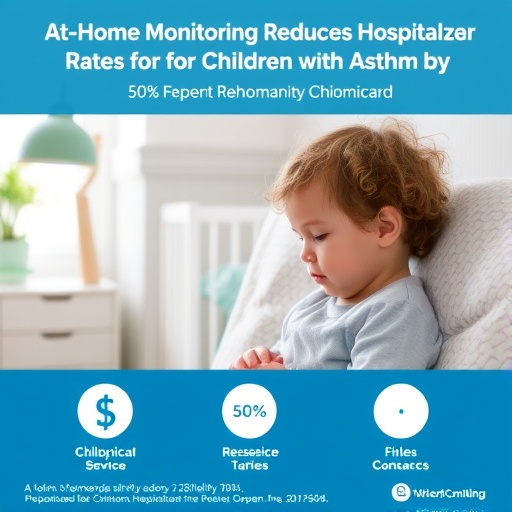Children suffering from asthma face numerous challenges, particularly when it comes to managing their condition effectively. A recent study presented at the European Respiratory Society Congress in Amsterdam highlights a significant advancement in asthma management through at-home monitoring. This study, conducted with children aged between six and 18 at six Dutch hospitals from 2017 to 2023, reveals a striking correlation between home monitoring and reduced emergency healthcare visits, showing that children utilizing a remote monitoring system are approximately half as likely to seek emergency assistance or require hospitalization than their counterparts receiving traditional in-person care.
Asthma is a widespread chronic condition, affecting roughly one in ten children across Europe. The research showcased that the at-home monitoring platform utilized by families allowed for a more proactive approach in managing asthma symptoms. Families interacted with an application monthly, which facilitated tracking of symptoms and lung function, while also integrating personalized asthma action plans. This method significantly eases the burdens placed on families since it lowers the requirement for frequent in-person outpatient visits, particularly when the symptoms are stable. The ease of access to monitoring data can empower families and children to better understand and manage their chronic conditions.
The research, led by Dr. Martinus Oppelaar from Amalia Children’s Hospital in Nijmegen, not only reinforces earlier clinical trial findings but also emphasizes the importance of adapting these solutions for everyday healthcare settings. Dr. Oppelaar indicated that their previous research had successfully demonstrated the feasibility of remote monitoring in a controlled trial, achieving a 50% reduction in standard outpatient appointments. However, the complexities of real-world healthcare necessitated further examination of how this technology can seamlessly fit into routine clinical practice and improve patient outcomes.
Over the course of the study, 2,528 children with asthma were monitored, with 1,374 employing the remote monitoring app to varying degrees. Remarkably, the researchers found that those utilizing the app enjoyed a substantial reduction in emergency department visits—by approximately 49%—and hospitalizations decreased by about 57%. The results further showed that for every 39 children utilizing home monitoring systems, one hospitalization could be averted. Such statistics emphasize the potential for remote monitoring systems as a crucial tool in preventative pediatric care.
The Luchtbrug system, designed by researchers at Radboud University Medical Center, played a key role in providing valuable insights into children’s asthma control levels. Initially, 77% of monitored children were considered to have well-controlled asthma, but this number increased to 86% following the introduction of the remote monitoring system. Such improvements indicate that the early intervention facilitated by these platforms can lead to better disease management and overall quality of life for children suffering from asthma.
Dr. Oppelaar discussed the immediate and long-term benefits observed with remote monitoring, noting a significant decline in emergency room visits and hospital admissions, alongside a sustained reduction in asthma symptoms. He emphasized that this is not a cure for asthma but an innovative way for families to better navigate the intricacies of managing a chronic illness. The monitoring system acts as a safety net, alerting healthcare providers when symptoms worsen, allowing for timely interventions that can adjust treatment plans as necessary.
Dr. Louise Fleming, an expert in pediatric asthma care and professor at Imperial College London, corroborates the findings of this research, highlighting the criticality of effective asthma management in children. With asthma being a common condition, the repercussions of uncontrolled symptoms can result in severe emergency situations, disrupting families’ lives and prompting urgent hospital visits. The study’s evidence reinforces that with the right tools, children can enjoy a more normal life while effectively managing their asthma.
In conclusion, this pioneering research opens new avenues for improving asthma care in children. The integration of home monitoring technology into healthcare not only has the potential to minimize the financial burden on healthcare systems but also ensures a more supportive environment for families to manage their children’s health. The adaptive use of digital solutions in healthcare transforms how chronic conditions like asthma are approached, fostering a collaborative effort between families and healthcare providers.
The findings advocate for the broader adoption of remote monitoring technologies in pediatric healthcare. Should similar systems gain traction across diverse healthcare settings, it could herald a new era of tailored healthcare solutions that promote better health outcomes while concurrently optimizing healthcare resources. As Dr. Oppelaar aptly puts it, the digital transition in healthcare is not just a luxury; it is a necessity for enhancing quality and accessibility of care for all patients.
Such innovations highlight the exciting intersection of technology and health, where the future of pediatric asthma management is not only about treating the illness but about enacting real change in the lives of those affected. This research sets the foundation for evolving healthcare strategies that prioritize patient engagement and individualized care, fostering a healthier future for children with asthma.
Subject of Research: Remote monitoring for asthma management in children
Article Title: Home Monitoring Significantly Reduces Hospital Visits in Children with Asthma
News Publication Date: October 2023
Web References: https://www.eurekalert.org/news-releases/1099527
References: https://www.eurekalert.org/news-releases/1099527
Image Credits: Martinus Oppelaar / ERS
Keywords
Health and medicine, Diseases and disorders, Respiratory disorders, Asthma, Pediatrics, Medical technology.





